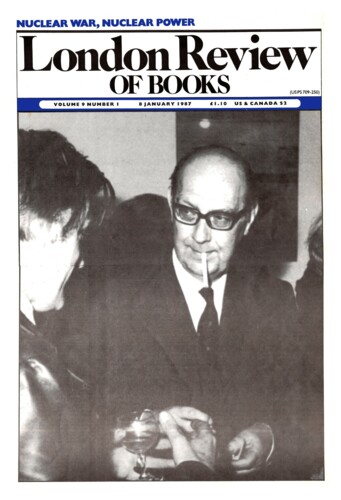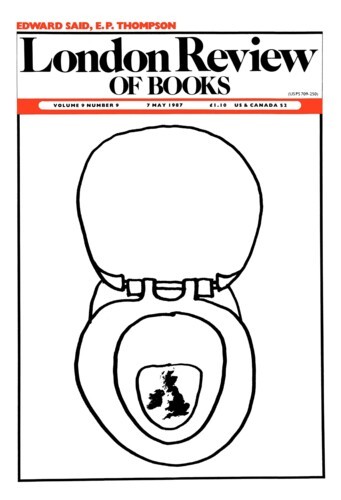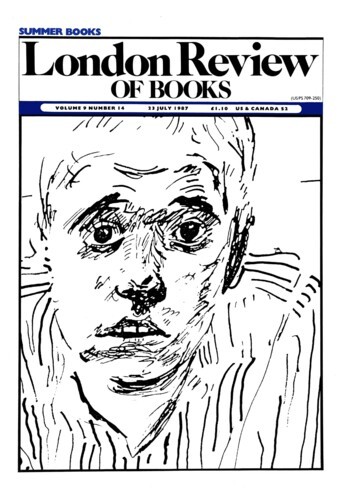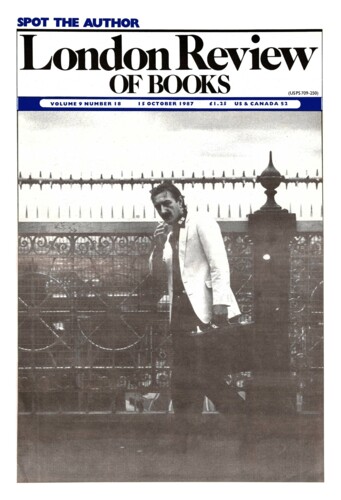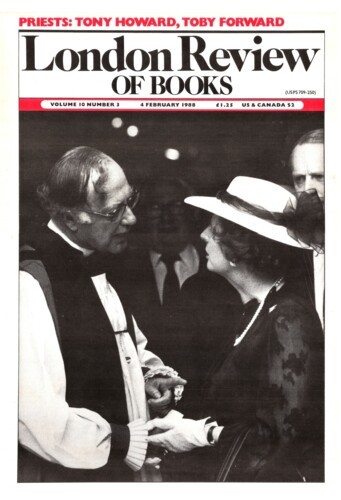John Lanchester
John Lanchester is a contributing editor at the LRB. His most recent book is Reality and Other Stories.
As a returning lord
John Lanchester, 7 May 1987
This comes from ‘Thinkability’, the introduction to Einstein’s Monsters, and is, in a way, a typical Martin Amis paragraph:
Dying Falls
John Lanchester, 23 July 1987
As well as having themes, preoccupations and voices, writers often have a favourite cadence, which is sometimes apparent as the shape towards which their fictions tend. If they do have such a cadence, it will be more apparent in short fictions than in their longer work, for very prosaic reasons: because the beginning and the ending of a short story are more likely to be read in the same sitting, and because you get more endings per volume to judge by. In poetry the tendency is more marked still – so marked, in fact, that a lot of contemporary verse seems to have the same shape, with the poem moving towards the ironic, downbeat shape that Terry Eagleton has called a ‘pulled punch’.’
Absent Authors
John Lanchester, 15 October 1987
‘Those who have much leisure to think, Dr Johnson wrote, ‘will always be enlarging the stock of ideas, and every increase of knowledge, whether real or imagined, will produce new words or combinations of words.’ The words that aren’t in a dictionary can convey nearly as much information as the words that are: the main body of the OED, which was completed in 1933, has no entry for the first word I looked up in it – ‘genocide’. There is as yet no mention of ‘Deconstruction’ in the OED or in its Supplement.’
Ozick’s No
John Lanchester, 4 February 1988
Cynthia Ozick’s critical writing everywhere expresses a ferocious distaste for the purely aesthetic. The central idea in Art and Ardour, her collection of critical essays, concerns the conflict between the aesthetic and the moral views of literature and of life. She tells the story of a friend’s child coming across a statue of an Egyptian cat deity in a museum. ‘ “I understand,” said the child, “how they wanted to bow down to this cat. I feel the same.” And then she said a Hebrew word: asur – forbidden – the great hallowed No that tumbles down the centuries from Sinai … ’ Asur: many of her speculations and evaluations seem to say that. A characteristic judgment is that made on Truman Capote, whose work is full of the idea that’
Podcasts & Videos
The Omicron Wave
John Lanchester, Rupert Beale and Thomas Jones
John Lanchester and Rupert Beale talk to Tom about the spread of the latest variant, where we might stand in the story of Covid, and the failures of the state in coping with the pandemic.
Running, Diving, Bleeding
John Lanchester and Thomas Jones
John Lanchester talks to Thomas Jones about ‘visible’ cheating in sport, that is, the kind which is against the rules but within the ethos of the game, from diving in football to bodyline bowling in...
The Long Way Round
John Lanchester and Thomas Jones
John Lanchester talks to Thomas Jones about his experience of being on a cargo ship blocked from entering the Suez Canal in 1967, his subsequent journey round the Cape of Good Hope, and the modern-day...
Patricia Lockwood talks to John Lanchester about her debut novel No One is Talking About This.
Maigret Returns
John Lanchester and Thomas Jones
John Lanchester talks to Thomas Jones about the author of the Maigret stories, whose output was so prodigious that even he didn't know how many books he wrote.
John Lanchester discusses his chilling collection of short stories, which explores the uncanniness of modern life through demonic phones, haunted selfie-sticks and other technology gone horribly wrong.
Brexit Blues
John Lanchester
John Lanchester reads his piece on the implications of the UK’s EU referendum.
The LRB at 40
Mary-Kay Wilmers, Alan Bennett, Andrew O’Hagan, John Lanchester, Yun Sheng and Nicholas Spice
We look back at 40 years of the LRB in our anniversary event at Conway Hall.
John Lanchester
David Runciman, Helen Thompson and John Lanchester
David and Helen talk to John Lanchester about banks, money and power. Why have so few bankers gone to jail since the financial crisis? Can the Euro survive? Should we be more frightened of unaccountable...
Story: ‘Coffin Liquor’
John Lanchester
Toby Jones reads John Lanchester’s ghost story.
George Monbiot and John Lanchester discuss Monbiot’s latest book, How Did We Get Into This Mess?, and assess the state we’re in now. The event was recorded at the London Review Bookshop on 7 July...
Bitcoin and the Nature of Money
John Lanchester
John Lanchester explains what bitcoin is, and what it tells us about money.
Pieces about John Lanchester in the LRB
Hong Pong: John Lanchester
Thomas Jones, 25 July 2002
First, let me declare a disinterest. John Lanchester and I are both involved, in different ways, with the London Review of Books, but otherwise have nothing to do with one another. Now...
On the Run: John Lanchester
Adam Phillips, 2 March 2000
The name is ordinary, so the book announces itself as a book about no one special; though, of course, when men without qualities become the subjects of novels a certain gravity (if not grace) is...
Read anywhere with the London Review of Books app, available now from the App Store for Apple devices, Google Play for Android devices and Amazon for your Kindle Fire.
Sign up to our newsletter
For highlights from the latest issue, our archive and the blog, as well as news, events and exclusive promotions.
